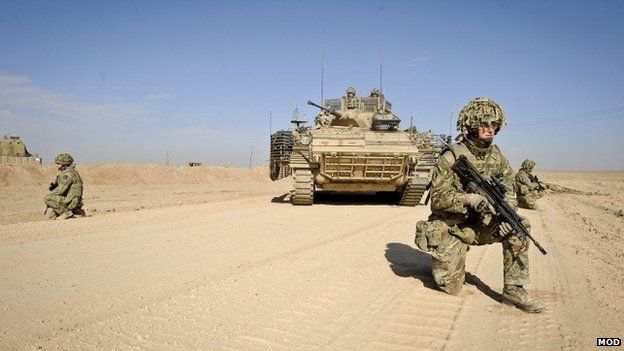Army reforms risk leaving capability gaps, say MPs
- Published
- comments

The Army faces possible manpower "gaps" unless ministers step up a drive to recruit reservists, MPs have warned.
The government is cutting the number of regular forces and increasing the number of trained reserves in an effort to save £10.6bn over 10 years.
But the Public Accounts Committee said it was behind its target and lacked "understanding" of how to reach it.
Defence Secretary Michael Fallon said the government's aims were "challenging" but achievable.
But Labour called the report, which comes out as the UK hosts the Nato summit in Newport, south Wales, "hugely embarrassing".
'Lower morale'
The coalition's Army 2020 programme is aimed at reducing costs over the next few years. It involves cutting the number of regular soldiers from 102,000 to 82,500 and increasing the number of reservists from 19,000 to 30,000.
But the committee's report warned: "Shortfalls in Army recruitment are increasing the risk of capability gaps emerging in some parts of the Army's structure."
It added: "A huge step-up in performance is required if the Army is to hit its ambitious target of recruiting 9,270 new reserves in 2016-17. The size of the regular Army is reducing faster than originally planned but the size of the trained Army Reserve has not increased in the last two years because more people have left the reserve than joined."
While the Army had put some contingency plans in place which could help in the short term, there may be "long-term negative consequences", the MPs said. Tours of duty for regular soldiers could be extended, but this "could lead to lower morale and more people leaving... thereby exacerbating the problem".
Capita, the private firm brought in to handle recruitment, was said to have brought in 2,000 reserves in 2013-14 against a target of 6,000.
The committee's chairman, Labour MP Margaret Hodge, accused the MoD of "bungling" its contract with the company, adding that there had been "no clear understanding of the scale of the recruitment challenge" and "poor information about potential recruits".
For Labour, shadow defence secretary Vernon Coaker said the report was "scathing" and showed a "litany of catastrophic failures at the Ministry of Defence".
'Flexibility'
He added: "Defence ministers were advised that these plans would not work unless they were properly tested and monitored. They were warned that front-loading cuts to the Army and back-ending recruitment to the Reserves would leave the armed forces under strength."
The MoD rejected much of the committee's criticism, saying the Army had been properly consulted on the Army 2020 programme.
It added that "flexibility" was at its heart and that "the effectiveness of the Army is not simply based on its size; it is about the capability that force is able to bring to bear on the battlefield around the world".
Defence Secretary Michael Fallon said: "The Chief of the General Staff and I are confident that we will reach our target of 30,000 trained Army Reservists by 2018-19. Indeed, we have arrested the many years of decline and neglect that has plagued our Reserve Forces and now we need to build on that.
"Our Army 2020 plans are on track and will deliver by 2020 the Army we need to counter the wide range of threats we face."
Improved recruiting had seen "a steady stream of recruits coming through the door", Mr Fallon said, adding: "Our targets are challenging but they are achievable. With a government investment of £1.8bn in better training and equipment, I believe that many young people will realise the great offer we have for challenging and exciting roles in the Reserves."
- Published4 September 2014
- Published4 September 2014
- Published31 January 2013